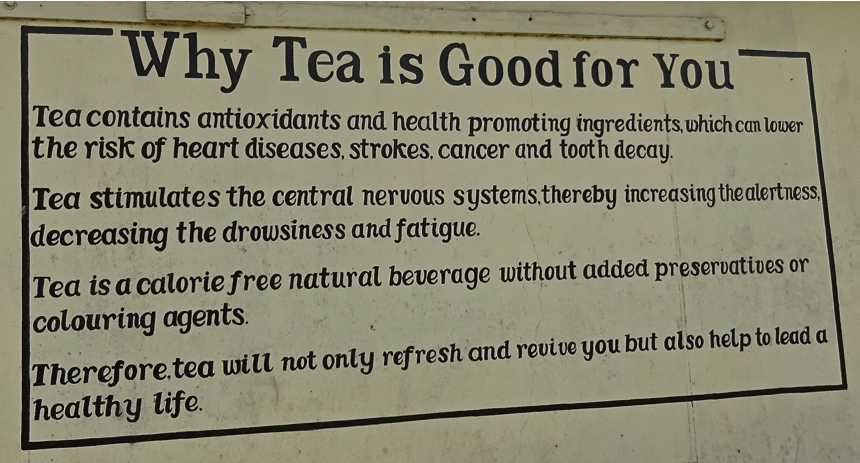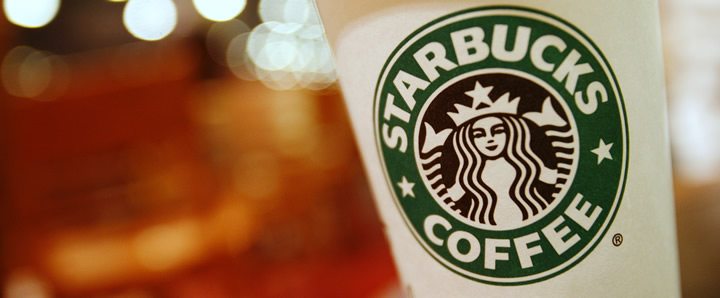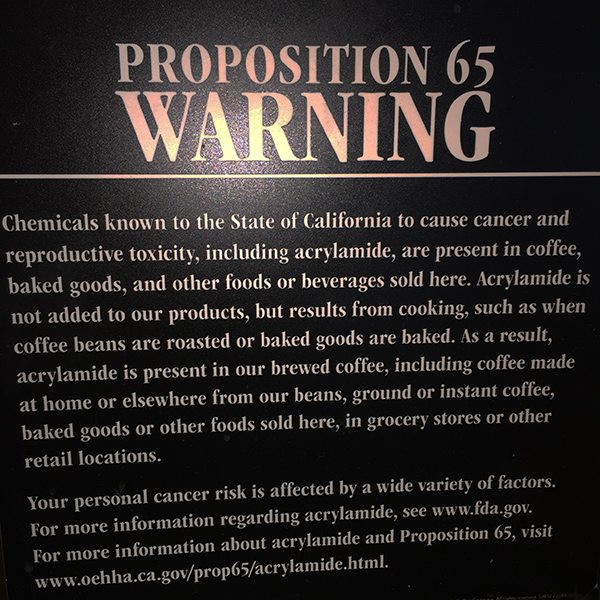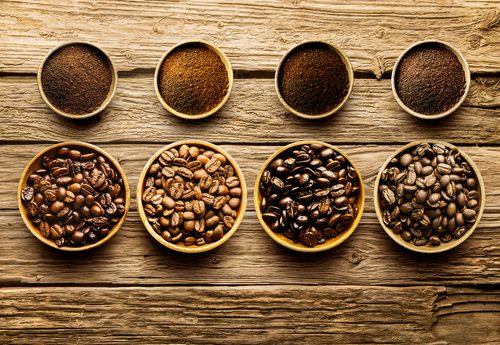I’ve felt incredibly inspired and introspective in every way from my trip to Sri Lanka, including thinking deeply about tea versus coffee. Coffee seems to be more popular in the Western world, but in reality, tea dominates worldwide, with about three cups of tea for every one cup of coffee[i].
Sri Lankan, or Ceylon, tea is a huge part of the culture over there, so I drank tea daily. I had to ask for very weak, super watered-down pots of tea (yes, even more water, tsuthi! (thank you!!)), as they traditionally drink a very strong black tea, which my very weak caffeine tolerance could not even come close to handling!

Tea fields around Ella, Sri Lanka
Then I came back to the States and went into Starbucks for a meeting (where I get organic tea), and saw this off-putting sign (more on this further along), which prompted this discussion further.
In Sri Lanka I was blessed to visit the stunning tea plantations around Ella, mountains of beautiful tea crops dotting the landscape as far as the eye can see, interrupted only with bursts of gorgeously bright skirts and blouses from the many Tamil women working to pick the leaves. It’s only when you get out of the car (or train) that you can hear an additional layer of beauty: the buzz-like, constant chatter of all the women conversing with each other.
Imagine if you were with a bunch of girlfriends picking tea leaves (which I imagine they could pretty much do in their sleep after a while) all day…wouldn’t you chat also?! They didn’t even look up for a second as we were stopping and looking around- they were in their own little world, completely immersed in their picking and chatting away in Tamil.
BUT what I really want to talk to you about is tea versus coffee.
I’ve always been fascinated with tea, and it is seems naturally obvious as a beauty beverage. Think about it- you steep dried leaves and parts of plants into hot water and the essence brews in the water, which you then sip. It sounds magical right?
It is. Everything from flavonoid antioxidants (which have been shown to reduce heart disease as well as cancer[ii]) to certain minerals and vitamins is imparted in various teas, as well as properties of being able to increase your metabolism, promote digestion, burn fat, balance your dosha type (elemental constitution in your body, per Ayurvedic principles), and more.
Sipping hot tea is soothing and amazing for your health and beauty. I am a huge fan of tea, and would encourage you to bring it into your life, whether it’s sipping it in the afternoon or in the evening to wind down, or mid-morning. Whenever! You can even sip a little of your hot tea while eating meals, which is said to help promote good digestion, according to Traditional Chinese Medicine and Ayurveda.

This sign was posted in the tea factory I visited in Sri Lanka.
Everywhere I’ve been around the world- from Mongolia to Rwanda to Nepal to India to Peru and beyond has their own unique types of tea with different attributes (Okay except for maybe Italy and some other Western countries where coffee seems to dominate; it wasn’t always that easy to get great tea over there, I have to say!).

It was amazing to learn about the tea process at this factory in Ella. From picking to shipping out, including everything in between – the drying, breaking down into different grades and cleaning, etc. it is only 24 hours!
My Perspective On Coffee
Now coffee on the other hand, has never felt intuitively to me as a beauty food. Sure, I know many of you (as well as my clients) love it and prefer it, and I’m not saying that you have to fully stop. But I want to give you my perspective.
First of all, coffee is so…well dark and murky looking! Many people can’t even stomach it without adding in cream and sugar (which have their own issues of course). It’s just so, well, dense looking. It reminds me of motor oil. It doesn’t impart a sense of lightness and support to a youthful complexion, at least from a visible sense, though coffee beans too of course come from nature.
Coffee is Acidic
Furthermore, coffee is super acidic. About 30 types of acids have been identified in coffee beans[iii]. Though some of the acids, such as chlorogenic acid, may have some research to support that it may (there is still dispute about this) help weight loss- the main argument in favor of green coffee beans- the fact remains that coffee is still pretty acid-forming on the pH scale with a pH of around 4.8[iv]. Coffee comes in different roasts that contain different compounds, and these different levels of compounds in turn cause your stomach cells to produce more acid[v]. By the way it seems darker brews have less caffeine and ironically may be somewhat less acidic.
Everything that you eat, and of course drink, has an effect on your overall pH, so you want to be cognizant of your overall balance. You don’t need to eat all alkaline foods, but you want to pick and choose your acid “battles” or foods/drinks wisely, knowing they all have an effect. So if one cup of coffee is that important to you, then great. But if you can easily swap it for an antioxidant-containing, less acidic cup of say green tea, even better I say.
Green Coffee Beans and Weight Loss?
So quick digression back to the green coffee beans, which some time ago were all the rage as a purported weight loss supplement. These not yet roasted beans are said to have higher levels of the chemical chlorogenic acid, which some believe positively affects how your body handles blood sugar and metabolism[vi]. This claim is highly controversial though, with some research saying it is helpful and some saying it is not.
My general, overall take is to avoid weight loss supplements in a pill form. I just think if you eat in a balanced way made up largely of plant-based, fiber-filled foods that supports your digestion, you don’t need to roll the dice with an overabundance of pills that may or may not work, but either way your body has to metabolize.
Conventional coffee is one of the most pesticide-sprayed crops in the world. Not only may some levels of the toxic residues end up in your cup of coffee (which may vary), but it implicates how our choices affect the greater whole: the pesticides end up in the environment and the locals farmers are exposed to these toxins. It’s a truth we have to be conscious of.
What’s up with that scary sign in Starbucks?!

If you walk into a Starbucks, you will see the sign I reference above, which states: “Proposition 65 Warning. Chemicals known to the State of California to cause cancer and reproductive toxicity, including acrylamide, are present in coffee, baked goods and other foods or beverages sold here….”
The U.S. Food and Drug Administration released a consumer warning on acrylamide, a naturally a chemical found in cooked foods and beverages, including coffee, which has been shown in research to cause cancer in animals[vii].
Coffee beans are roasted, and it is in this roasting process that that leads to the browning of the beans, and the chemical creation of acrylamide. Though the further roasting of the beans may reduce the acrylamide levels, the fact remains that some may remain in the cup of brewed coffee that you drink.
In reality it may not be as scary as it might appear. There may be in fact very little of this naturally occurring compound in your coffee. But to be on the very safe side, Starbucks is putting up this sign to appease this law. By the way this warning can also appear on natural and organic products that may contain naturally occurring and safe levels of certain compounds, to avoid potential legal issues. It’s off-putting, but these Prop 65 signs appear in apartment buildings and various products everywhere, so you have to decide for yourself if the potential risks against the actual amount you consume (which may be negligible) is worth avoiding, versus the legality issues of these companies/buildings trying to play it as safe as possible with these warnings.
Back to Tea
There’s a lot of issues you have to weigh for yourself around coffee, as you can see. I personally, cold turkey gave up coffee well over a decade ago when I learned about some of its potential negative health and beauty implications. While there is always ups and downs put out in the media about one study or another that some aspect of coffee is purported to be good for you, to me it just doesn’t intuitively feel like a good beauty choice. I’d rather get my acid load from dark chocolate treats, and I am more than happy with tea (I do LOVE drinking hot things).
Organic tea has so many upsides! Here are some of my faves:
- Hibiscus: I love the brilliant color this produces in tea and it’s floral taste. Yum! Contains antioxidants and is said to help lower blood pressure.
- Rooibos (red tea): This is one of my all time faves, which hails from South Africa. It’s full of flavonoid antioxidants and has no caffeine. It’s hearty and delicious tasting.
- Fresh ginger and lemon tea: For us Beauty Detoxers we know this as Detox Tea, and it is still my all time fave. Promoting cleansing, beauty and digestion, why wouldn’t you want to make this super easy, inexpensive brew?
- Fresh mint tea: It’s said to be a digestive aid, but the main reason I admit I like this tea is because it brings me great pleasure to pluck leaves off of a plant I myself own and stick them in a tea mug to steep! From living in a tiny apartment in New York City to a very busy life in LA, I can still handle a tiny mint plant!
- Chamomile tea: I kind of overloaded permanently on this during my rainy trek to Machu Pichu where I drank it in buckloads to attempt to warm my shivering body up (I trekked in soggy jeans and everything including my sneakers and sleeping bag got sopping wet and I didn’t really sleep for days…it’s a long story but ask me about it sometime if we meet at a book signing or in the market somewhere :) ), where it’s known as tea de manzanilla in Peru, but I still order it at restaurants when there is nothing else herbal to sip on. It’s said to help promote sleep and be soothing.
- White tea: Uncured and unfermented. One study showed that white tea has the most potent anticancer properties compared to more processed teas. We saw how they pluck the precious silvertip white tea from each tea plant in Sri Lanka.
- Green tea: Made with steamed tea leaves, it has a high concentration of EGCG and has been widely studied to help prevent cancer and even burn fat. It does have decent levels of caffeine so be cognizant! My (and Katelyn’s!) favorite kind is the kind with the crunchy little brown rice bits brewed in there. It’s a Japanese type known as Genmaicha.
- Oolong tea: This has more caffeine so I don’t drink it daily, but I love its earthy taste. It’s believed by some to help lower cholesterol and potentially be a weight loss aid.
- Lots more but that’s a start! I’ll do a separate post sometime on some Ayurvedic teas, like Tulsi, that I really love as well (that’s a whole separate post).
A Little Advice for my Coffee-Drinking Beauties
If you do want to drink coffee, try these tips:
- Drink organic, pesticide-free coffee! It’s way better for you and the environment.
- Check out cold-brewed coffee, which is said to help reduce the acidity in coffee ( we serve this at Glow Bio).
- Try choosing darker roasts of coffee beans, which are said to retain less acid than their lighter roast counterparts.
- Stick to one cup a day- and enjoy it when you do drink it. :)
Hope you enjoyed our little discussion!
What are your favorite types of tea? Do you think given all the health and beauty benefits, that you will start drinking tea more ??
Have a beautiful day and see you back here soon!
With love and gratitude,
Kimberly
Resources:
[i] https://www.pewresearch.org/fact-tank/2013/12/20/chart-of-the-week-coffee-and-tea-around-the-world/ [ii] https://www.webmd.com/diet/tea-types-and-their-health-benefits [iii] https://www.livestrong.com/article/511107-how-to-neutralize-the-acid-in-coffee/ [iv] https://en.wikipedia.org/wiki/PH [v] https://www.rodalesorganiclife.com/food/low-acid-coffee [vi] https://www.webmd.com/vitamins-supplements/ingredientmono-1264-green%20coffee.aspx?activeingredientid=1264&activeingredientname=green%20coffee [vii] https://www.fda.gov/ForConsumers/ConsumerUpdates/ucm374855.htm







What are some good tea brands? I know you can buy the tea loose at whole foods but it is pretty expensive. Everyone speaks very highly of tea and having medicinal properties, maybe I have a poor brand or haven’t stuck with it long enough but I haven’t seen much result from drinking tea.